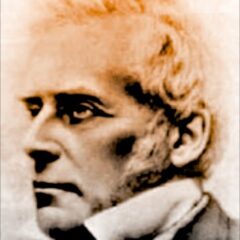From a letter written in 1861 published in the collected Writings volume 10. Doctrinal 3. Page 185.
The Wesleyan Doctrine
J N Darby maintained that the Wesleyan doctrine of free will was a consequence of a failure to appreciate the fact that man is entirely lost. He went as far as saying that those who believed in free will could not have a full conviction of sin. Such an idea is a perversion of Christianity
Free will belongs to the natural man. ‘The carnal mind is enmity against God: for it is not subject to the law of God, neither indeed can be. So then they that are in the flesh cannot please God’ (Rom 8:7-8).
Man’s heart is so corrupted and his will so obstinate that nothing can induce him to submit to God, to receive the Lord and abandon sin. A godly Wesleyian feels that he must please God in his own power: he does not recognise the total fall of man, something incompatible with pure grace.
So, the question is: is the old man changed, instructed, and sanctified? or do we receive a new nature in order to be saved?
Redemption
The truth is that God has shown that man is wicked, without remedy, and the cross of Christ condemns man — sin in the flesh. Through redemption accomplished by Christ, we have a new life, eternal life, come down from heavenin His Person. Redemption, the accomplished work of Another, loses its force when one entertains ideas of improving the old man. Arminianism[1], or rather Pelagianism, pretends that man can choose a practical deliverance from a moral state, rather than redemption.
Philosophically and morally speaking, freewill is a false and absurd theory. Free will is a state of sin. Acting in free will follows sin. What cruelty it would be to propose a duty to man who has already turned to evil!
[1]The following are the main points of Arminianism according to Wikipedia:
- Salvation (and condemnation on the day of judgment) was conditioned by the graciously enabled faith (or unbelief) of man.
- Atonement is qualitatively adequate for all men, “yet that no one actually enjoys [experiences] this forgiveness of sins, except the believer …” and thus is limited to only those who trust in Christ;
- “That man has not saving grace of himself, nor of the energy of his free will”, and unaided by the Holy Spirit, no person is able to respond to God’s will;
- The (Christian) Grace “of God is the beginning, continuance, and accomplishment of any good”, yet man may resist the Holy Spirit; and
- Believers are able to resist sin through Grace, and Christ will keep them from falling; but whether they are beyond the possibility of ultimately forsaking God or “becoming devoid of grace … must be more particularly determined from the Scriptures.”
Pelagianism is a heterodox Christian theological position that holds that the original sin did not taint human nature and that humans have the free will to achieve human perfection without divine grace. Pelagius (c. 355 – c. 420 AD), a British ascetic and philosopher, taught that God could not command believers to do the impossible, and therefore it must be possible to satisfy all divine commandments. He also taught that it was unjust to punish one person for the sins of another; therefore, infants are born blameless. Pelagius accepted no excuse for sinful behaviour and taught that all Christians, regardless of their station in life, should live unimpeachable, sinless lives

